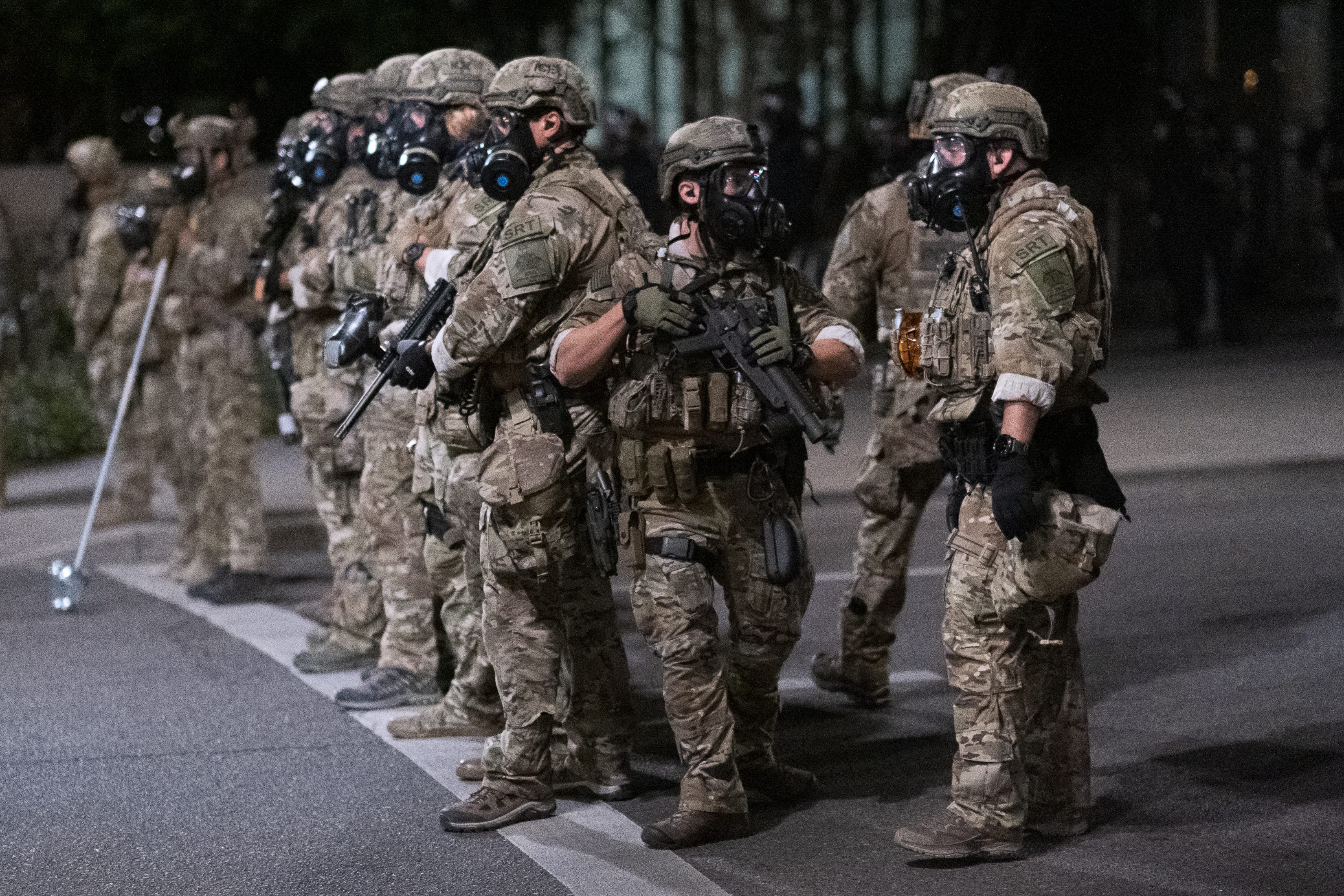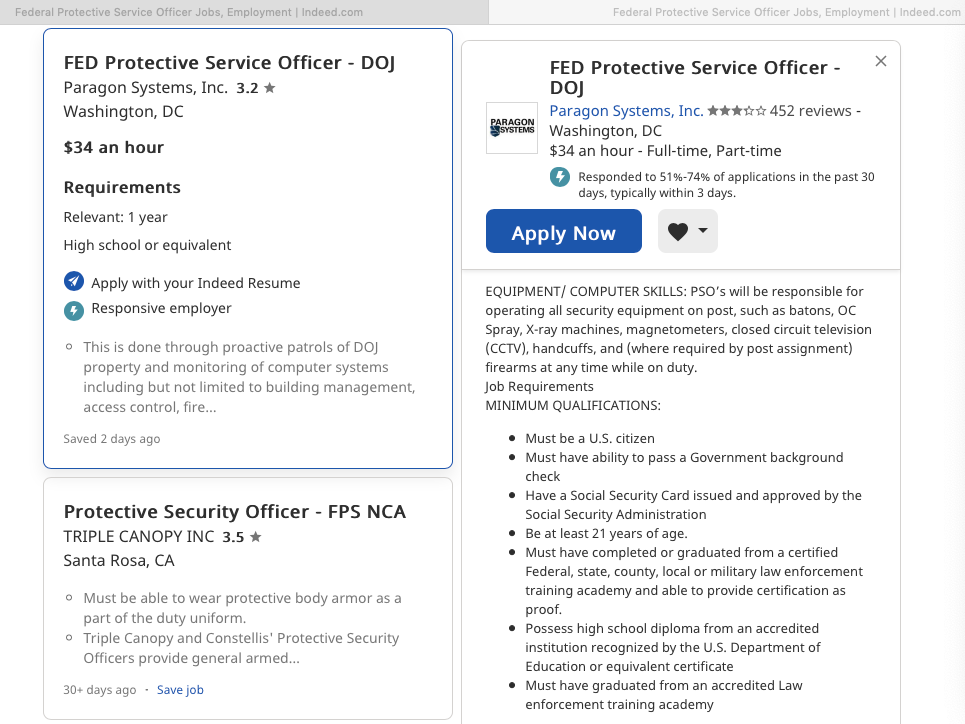Congress needs to shine a light on the use of private security firms, including ‘Blackwater’ legacy companies, in Trump’s response to ongoing civil rights protests
The Trump administration’s deployment of federal law enforcers in Portland, Oregon, as part of a supposed effort to protect government property has prompted at least two lawsuits alleging that their show of force has resulted in abuses of authority and the unnecessary use of violence against peaceful protesters, journalists and observers.
What has not been reported widely in the media, however, is the fact that the Department of Homeland Security (DHS) unit that is coordinating the “crowd control” effort — an agency called the Federal Protective Service (FPS) — is composed largely of contract security personnel. Those contractors are being furnished to FPS by major private-sector security companies like Blackwater corporate descendant Triple Canopy as well as dozens of other private security firms.
In fact, FPS spends more than $1 billion a year on these contract security guards who are authorized to conduct crowd control at federal properties, such as those in Portland. And, based on available photographic and document evidence, it appears those private contractors are now part of the federal force arrayed in Portland and are likely to be part of the federal response President Trump has promised to stand up in multiple other cities, including Chicago, Detroit, New York, Philadelphia and other urban centers led by Democratic mayors across the country.
There are some 13,000 security guards nationwide employed by FPS via contracts with private security firms, a figure that can be expanded through existing and future contracts. Via contracts with FPS, more than 50 private security firms provide guards — referred to as protective security officers (PSOs) — to the agency in the Washington, D.C., area alone.
Among the responsibilities of these contract guards is to assist federal law enforcers with crowd control at federal properties as needed.
“The most difficult tasks PSOs are called upon to perform include standing for prolonged periods of time and interacting with large volumes of people,” states a past interagency agreement involving FPS, U.S. Immigration and Customs Enforcement, and the U.S. Office of Personnel Management. “Other demanding, but less frequent, tasks include responding to medical emergencies, performing CPR, and performing crowd control [such as is occurring in Portland in recent weeks].”
There is a major problem, however, with using these FPS contract guards — who are supposed to be limited to patrolling and securing federal facilities and grounds — in long-running “civil disturbances” like those unfolding now in Portland, and elsewhere around the country. The FPS has a long history of failing to properly vet and adequately monitor and ensure that these guards have proper training and certifications, including proper firearms training.
That lack of training can pose a great risk to the safety of protesters and the law enforcers they work with alike should a situation become heated.
As outlined in a prior story on Medium, U.S. Government Accountability Office reports published between 2009 and 2014 on the FPS security guard program have uncovered guards with felony convictions; a large percentage of guard files examined with at least one expired certification, including a declaration they have not been convicted of domestic violence; and multiple security-guard files that were missing documentation on weapons training and security clearances, among other issues.
The role that these private contractors are playing in current crowd-control efforts in Portland, and the role they will play going forward if Trump does expand the federal intervention to other cities across the nation, is best described as opaque — seemingly on purpose. The danger, however, is that Trump and his attorney general, William Barr, will expand this private contractor force in extending the reach of the federal response to recent civil rights protests — creating what is essentially a national paramilitary police force.
One former U.S. Secret Service officer who was assigned to the White House raised an alarm when questioned about that prospect.
“This concerns me, as FPS officers train with us at the federal law-enforcement training center in Glynco, Georgia,” the former Secret Service officer said, asking that his name not be used. “I can assure you that a contract officer isn’t law-enforcement certified. …This sounds very shady, and it sounds like a lawsuit waiting to happen.”
Well, in fact, at least two lawsuits are now in motion, one filed by the American Civil Liberties Union (ACLU) Foundation of Oregon and the other by the Oregon Attorney General’s Office, with both lawsuits alleging the federal response in Portland is violating the constitutional rights of U.S. citizens participating in legitimate, First Amendment-protected protests.
“The American Civil Liberties Union Foundation of Oregon today sued the Department of Homeland Security and U.S. Marshals Service, which have deployed federal agents to Portland, Oregon,” a press statement released by the ACLU states. “These agents, which have been deployed over the widespread objections of local leaders and community members, have been indiscriminately using tear gas, rubber bullets, and acoustic weapons against protesters, journalists, and legal observers.
“Federal officers also shot a protester in the head … with a rubber bullet, fracturing the person’s face and skull.”
The lawsuit filed this month by the Oregon’s Attorney General likewise accuses the federal crowd-control force — clad in riot gear and camouflage uniforms — of overstepping its legal authority.
“Oregon Attorney General Ellen Rosenblum this evening will file a lawsuit in federal court against the United States Department of Homeland Security, the United States Marshals Service, the United States Customs and Border Protection (CPB), the Federal Protection Service and their agents alleging they have engaged in unlawful law enforcement in violation of the civil rights of Oregonians by seizing and detaining them without probable cause,” the Oregon Department of Justice said in announcing the litigation.
What has not been addressed yet in this case is the unique legal and constitutional challenges posed by deploying a federal force against U.S. citizens that is composed of a mix of government agents and private contractors, including CPB’s Special Response Team [SRT], U.S. Marshals and DHS police — specifically the FPS, which is overseeing the effort and employs thousands of contract security personnel.
“The Department of Homeland Security (DHS) and its components will continue to work tirelessly to reestablish law and order,” CBP said in a press statement related to the federal response in Portland. “The Federal Protective Service (FPS) is the lead government agency that CBP personnel are supporting. CBP personnel have been deployed to Portland in direct support of the Presidential Executive Order and the newly established DHS Protecting American Communities Task Force (PACT). “
So, what evidence exists that private contractors working for FPS are actively engaged with federal agents in using physical force against protesters in Portland? For one, that is part of their responsibility as FPS officers.
“As symbols of government, federal facilities are often the place where citizens congregate to express their concerns about an issue, often in the form of mass demonstrations or protests,” DHS’ website says in describing FPS. “When this happens, FPS law enforcement officers are on-site to ensure that all citizens can express themselves in a safe and peaceful manner. When demonstrations start to become violent against others, or disruptive to government operations, FPS officers will step in to regain the peace.”
A manual for security guards produced by FPS includes an entire chapter on handling “civil disturbances,” such as the protests now occurring across the nation over racial injustice — sparked by the police killing of George Floyd in Minneapolis on May 25.
“You may be required to take actions to control crowds during civil disturbances,” states the FPS private-contractor manual, published in 2008 and marked “For Official Use Only.” “You also may be required to assist law enforcement personnel during such situations.”
Photographic evidence from the protests in Portland also shows that FPS personnel are deployed in Portland as part of the federal crowd-control force. Some have described this federal force as a “secret police” unit because many of the federal police are clad in camouflage with no name tags and are extremely difficult to identify.
Photographs taken by an ACLU observer (Doug Brown) demonstrate how the uniforms of this opaque federal force are creating unnecessary confusion. The photos also raise concerns over whether some of the FPS personnel involved in the Portland response are, in fact, contract security personnel.

In the two ACLU photos displayed here, it is clear that in one shot [above] the group of law enforcers — with arm patches emblazoned with the letters SRT — is part of CPB’s Special Response Team.
The other photo [below], however, shows uniformed FPS officers standing next to an individual in camouflage who also has an FPS shoulder patch. Why are they dressed differently and how can anyone reasonably tell if those are private security contractors employed by FPS or members of the much smaller cadre of government agents, some 1,000 nationwide, employed by FPS?

And, if this federal tactical team is going to be deployed in multiple cities across the nation in the coming weeks, as Trump has threatened, how can that be accomplished without relying on FPS contract security personnel? Given FPS contract guards are expected to assist with crowd control, it’s reasonable to assume they are in this case as well.
In addition to Triple Canopy, another security firm FPS works with is Paragon Systems Inc., which in 2013, for example, inked a deal with FPS to provide security guards for federal owned and leased properties in Ohio that had a total contract ceiling of $93.4 million. Within the past month, Paragon ran an online advertisement seeking to hire security guards for FPS to provide “proactive patrols of DOJ property” at an undisclosed location or locations. A similar recent job-opening advertisement from Triple Canopy notes that contractors it is seeking to hire for an FPS post “must be able to wear protective body armor as part of the duty uniform.”

FPS spokesperson Robert Sperling responded to questions about the role FPS contract guards are playing in controlling crowds at recent protests by saying simply: “The Federal Protective Service protective security officers are manning their posts and do not have authority or jurisdiction beyond federal property.”
The use of contract security personnel in actions targeting U.S. citizens raises serious questions about the future of policing accountability in America. The privatization of policing is a lucrative business, with numerous private security firms already taking in hundreds of millions of dollars annually from contracts with FPS — not to mention the privatization of prisons that has long been in effect.
It seems determining the precise role private contractors are playing in using force against protesters, journalists and observers in Portland, and the role planned for them in other major urban centers in the weeks ahead, is fertile ground for congressional inquiry and legislation that will establish some firm bumpers for controlling the use and spread of this practice.
A former supervisory DHS agent interviewed for this story lays out the dangers of ignoring this issue:
“Before I left [DHS], I attended meetings about creating the private prisons. I was against it because of the lack of oversight,” states the former supervisory DHS official, who also asked not to be named. “Those meetings were used also to recruit like-minded personnel for high six-figure salaries after retirement [from their jobs as federal employees]. I was not invited back.
“… Outsourcing [to private contractors] is the way to protect your actual mission,” the former DHS agent says. “Layering [mixing federal agents in with contractors] provides plausible deniability. Jurisdiction and authority are given by the attorney general [in this case, William Barr].
“They can also use the authority of another agency [i.e., FPS] by being next to them (implied authority) …. Finding thugs is not a problem. Remember, they used mercenaries to capture [DEA agent] Kiki Camarena’s torturers [in Mexico].”
Stay tuned…..
 News Portland Business, Info & Events
News Portland Business, Info & Events